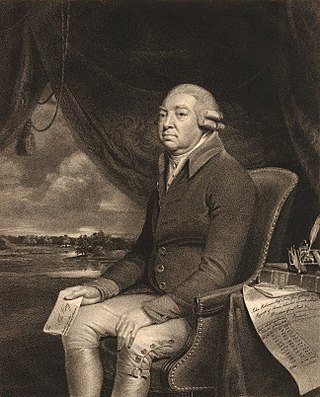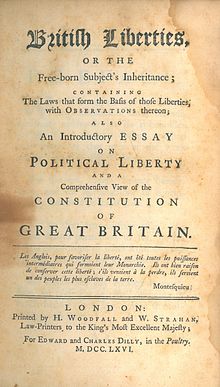
John Wilkes was an English radical journalist and politician, as well as a magistrate, essayist and soldier. He was first elected a Member of Parliament in 1757. In the Middlesex election dispute, he fought for the right of his voters—rather than the House of Commons—to determine their representatives. In 1768, angry protests of his supporters were suppressed in the Massacre of St George's Fields. In 1771, he was instrumental in obliging the government to concede the right of printers to publish verbatim accounts of parliamentary debates. In 1776, he introduced the first bill for parliamentary reform in the British Parliament.

Darby and Joan is a proverbial phrase for a married couple content to share a quiet life of mutual devotion.

Augustus Henry FitzRoy, 3rd Duke of Grafton,, styled Earl of Euston between 1747 and 1757, was a British Whig statesman of the Georgian era. He is one of a handful of dukes who have served as prime minister.
Junius was the pseudonym of a writer who contributed a series of letters to the Public Advertiser, from 21 January 1769 to 21 January 1772. The signature had been already used, apparently by him, in a letter of 21 November 1768. These and numerous other personal letters were not included in his Letters of Junius collection, published in 1772.

Sir Philip Francis GCB was an Irish-born British politician and pamphleteer, thought to be the author of the Letters of Junius, and the chief antagonist of Warren Hastings. His accusations against the latter led to the impeachment of Warren Hastings and Elijah Impey by Parliament. He belonged to the Whig party.

Samuel Johnson (1649–1703) was an English clergyman and political writer, sometimes called "the Whig" to distinguish him from the author and lexicographer of the same name. He is one of the best known pamphlet writers who developed Whig resistance theory.
Statutes at Large is the name given to published collections or series of legislative Acts in a number of jurisdictions.
The Morning Chronicle was a newspaper founded in 1769 in London. It was notable for having been the first steady employer of essayist William Hazlitt as a political reporter and the first steady employer of Charles Dickens as a journalist. It was the first newspaper to employ a salaried woman journalist Eliza Lynn Linton; for publishing the articles by Henry Mayhew that were collected and published in book format in 1851 as London Labour and the London Poor; and for publishing other major writers, such as John Stuart Mill.
Junius was the pseudonym of a writer who contributed a series of political letters critical of the government of King George III to the Public Advertiser, from 21 January 1769 to 21 January 1772 as well as several other London newspapers such as the London Evening Post.
Letters of Junius is a collection of private and open letters critical of the government of King George III from an anonymous polemicist (Junius) claimed by some to be Philip Francis, as well as other letters in-reply from people to whom Junius had written between 1769 and 1772. The collection was published in two volumes in 1772 by Henry Sampson Woodfall, the owner and editor of a London newspaper, the Public Advertiser.

John Glynn Serjeant-at-law of Glynn (1722–1779) was an English lawyer and politician who sat in the House of Commons from 1768 to 1779. Glynn was born to a family of Cornish gentry. He inherited his father's estate at Glynn in the parish of Cardinham, Cornwall, on the deaths of his elder brother and his nephew.

William de Grey, 1st Baron Walsingham PC KC, was a British lawyer, judge and politician. He served as Lord Chief Justice of the Common Pleas between 1771 and 1780.

William Woodfall was an English printer, publisher and Parliamentary reporter.
The Public Advertiser was a London newspaper in the 18th century.
John Mein was a Boston, Massachusetts, bookseller and publisher in the time before the American Revolution. Mein started Boston's first circulating library, and with his business partner, John Fleeming, Mein published the Loyalist newspaper, the Boston Chronicle, the first semi-weekly in New England.

John Robinson (1727–1802) was an English lawyer, politician and government official.
George Woodfall (1767–1844) was an English printer.

Samuel Minott was an American silversmith and retailer, active in Boston.










